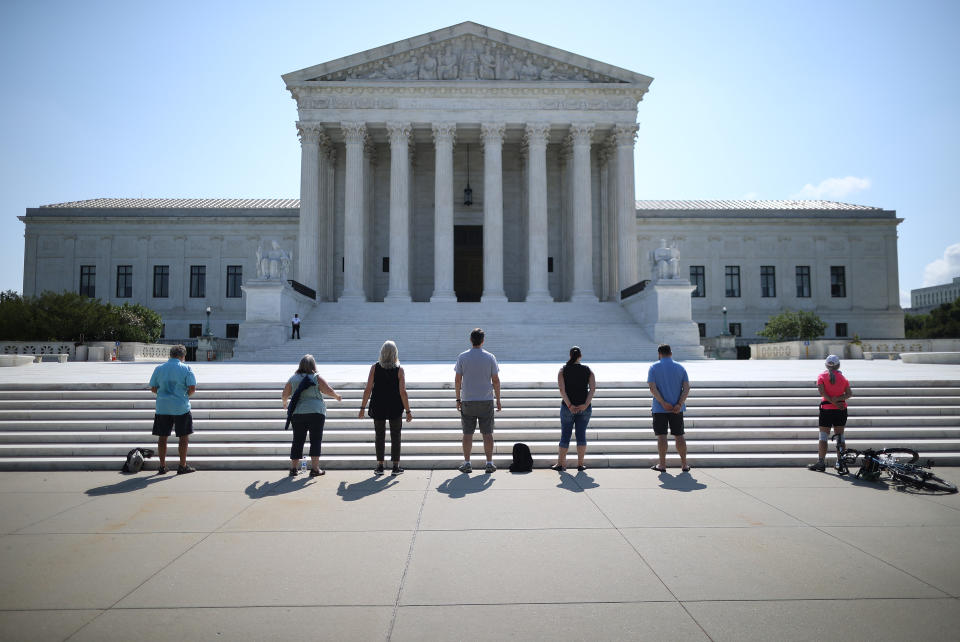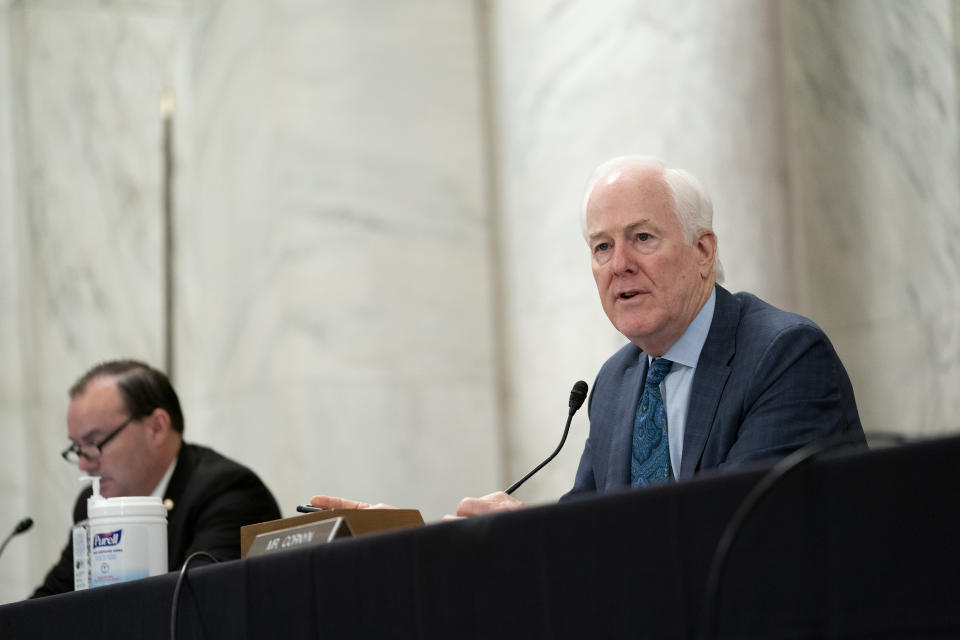'This is the ACA fight': Democrats' victory on Obamacare in 2018 could be key to Supreme Court battle
WASHINGTON — Seven days after the November presidential election, the Supreme Court will hear arguments in a case that could decide the fate of the Affordable Care Act, the 2010 law that has provided health coverage to millions of previously uninsured Americans. Democrats are using that looming reality to frame the opposition against Amy Coney Barrett, President Trump’s nominee to the high court. They say that with her on the court, the ACA will face an all but certain demise.

Democrats see the prospect of some 23 million Americans losing their health coverage as their most potent argument against Barrett’s nomination. It is an argument made all the more powerful, they insist, by the continuing ravages of the coronavirus pandemic.
“This is real,” says Jesse Lee, a senior executive at the liberal Center for American Progress and a former adviser to President Barack Obama. He dismissed the notion that a save-the-ACA message was merely “the best talking point” in the pitched battle of words between left and right. Preserving the increasingly popular Obama-era law, he says, “has been the American people’s No. 1 opposition to Trump.”
That opposition has succeeded before. Even if the Republicans appear to have the requisite Senate votes to confirm Barrett, Democrats believe that opposition can be successfully marshaled one more time. The health law, after all, is an all-too-familiar battleground on which the Democrats know how to fight.
Before he had even taken the oath of office, Trump set his sights on the Affordable Care Act, the signature legislative accomplishment of Obama, his predecessor.
“We have to get to business,” the president-elect said shortly before his inauguration in 2017. With both chambers of Congress controlled by Republicans, and Democrats still shell-shocked by November’s defeat, there seemed to be little that could keep the business of repealing and replacing the health law from being accomplished.

One hundred and ninety-nine days later, Sen. John McCain, R-Ariz., walked up to the Senate clerk and presented a downturned thumb. With that vote against repealing the Affordable Care Act, McCain put a definitive end to the efforts of Trump and congressional Republicans. Though hobbled in other ways, the health law survives to this day.
Saving the Affordable Care Act was Democrats’ first victory against Trump. It could also be a template for what they hope to be their final victory against a man who may be in the final months of his presidency.
The battle over the Supreme Court seat vacated by the death of Justice Ruth Bader Ginsburg is informed by the earlier fight over the ACA in ways both obvious and not. Although they recognize that their odds are long, Democrats believe that if they can articulate the same arguments and deploy the same tactics, they can prevail once again.
“This is the ACA fight,” People for the American Way president Ben Jealous told Yahoo News last week.
Trump announced on Saturday his nomination of Barrett, a judge on the Seventh Circuit Court of Appeals, to the high court. Republicans hope to hold confirmation hearings in record time so that she is confirmed by the full Senate before the presidential election on Nov. 3.
That means Barrett would be seated on the court to hear the combined argument for two cases known as California v. Texas. The cases challenge the individual mandate provision of the ACA, which requires people to have some form of insurance.

Without that mandate, the law cannot survive.
Democrats’ message is clear: Barrett will kill the ACA. The Center for American Progress calls her a “targeted missile” aimed squarely at the health law, and other groups have echoed that message. They argue that while Barrett may be a brilliant jurist with a compelling personal story, any senator who votes to confirm her is voting to repeal the Affordable Care Act.
“Our number one job is to communicate exactly what is at stake for the American people if Republicans jam through this nominee,” Senate Minority Leader Chuck Schumer wrote to his colleagues on Sunday. “The elimination of the Affordable Care Act is at the top of the list.”
He outlined his “strategy for fighting back” in the weeks ahead: “health care, health care, health care.”
That was also the strategy his counterpart in the House of Representatives, Speaker Nancy Pelosi, used to win back the House during the 2018 elections. Resisting progressive calls to expand the case against Trump to other causes, Pelosi urged Democratic candidates to relentlessly argue that keeping the entire Congress in Republican control would almost certainly allow them to scrap the ACA once and for all.
Polls at the time showed that Americans cared about health insurance more than they did about any other issue. Polls today show much the same thing. Though support for the law is far from universal, the majority of Americans like the Affordable Care Act, and they prefer expansion of the sort that Democratic presidential nominee Joe Biden has promised, as opposed to a Republican repeal.
Barrett’s long-standing adherence to constitutional originalism could lead her to rule in ways her Republican supporters do not predict, yet she has little room for ambiguity when it comes to the ACA. A federal appellate judge since 2017, Barrett has not been involved in any ACA-related rulings, but she has criticized the man who could soon be her boss — Chief Justice John Roberts — for his pro-ACA vote in a case known as NFIB v. Sebelius. “Chief Justice Roberts pushed the Affordable Care Act beyond its plausible meaning to save the statute,” she wrote in a 2017 book review.

She has also sided with conservatives who charge that the ACA does not offer sufficient exemptions to religious institutions.
Progressives have also argued that Barrett would work to curtail abortion rights, expand corporate power and achieve other conservative goals. Health care, however, could be their most potent weapon, especially in the midst of the coronavirus pandemic, which has left 204,000 people in the U.S. dead and 7 million sick.
“In the middle of a pandemic, Donald Trump is trying to force through the confirmation of a Justice who will help him destroy Obamacare,” Biden tweeted on Saturday.
“We can’t let them win,” he added.
COVID-19, the disease caused by the coronavirus, can leave people with long-term health problems that remain little understood, given the novelty of the pathogen. If the ACA is repealed, insurance companies will once again be able to reject coverage for people with preexisting conditions. That could leave thousands of coronavirus long-haulers, as people with lingering symptoms are known, without health insurance.
Telling people they are going to lose their health coverage is not exactly a winning message, and both parties know it. A senior Democratic staffer on the Senate Judiciary Committee noted that Sen. John Cornyn, R-Texas, had recently sent a mailer in which he promised to protect Texans’ health care.

He had, in fact, voted to repeal the Affordable Care Act in 2017. Then, in the midst of the pandemic in the spring, he told people to enroll in the ACA if they had lost their jobs and the insurance that employers provided.
Cornyn’s new mailer was evidence, the Democratic staffer told Yahoo News, of how “defensive” Republicans have become about health coverage. “That will be by far the most salient issue” in the fight over Barrett’s nomination, the staffer predicted.
Just what the fight over Barrett’s seat will look like is impossible to say. Senate Majority Leader Mitch McConnell appears to have the requisite votes, while Senate Judiciary Committee Chairman Lindsey Graham, R-S.C., is intent on running the confirmation process at the speed of light.
Trump spoke about the looming Supreme Court case at a White House press conference on Sunday. “If we can terminate, we are going to have a much better plan, and you will have your doctor, you will have your plan. You’ll have a lot of things that you don’t get with Obamacare,” he said. The details of that plan are not clear.
Democrats aren’t waiting. They hope to make every part of the process painful for their Republican counterparts. “As I’ve been telling folks, the goal is: What can we accomplish each step of the way?” says Zack Ford, press secretary for the progressive group Alliance for Justice. “How difficult can we make it for them just to hold the vote? How can we respond to the hearing? How can we respond to the floor vote?”
On the Democrats’ side are the majority of Americans; polls say that most people want the winner of the presidential election to appoint the justice.
“We’re not naive,” says Sen. Debbie Stabenow, D-Mich. “We know this is tough.” The best hope for Democrats appears to be some combination of public outcry and legislative delay.
That alone, though, won’t be enough. They then need for fissures to develop between Trump and McConnell, or for Barrett to commit a grave error during her confirmation hearings.

“Against all odds, we were able to stop the legislative repeal” of the Affordable Care Act, says Sen. Tammy Baldwin, D-Wis., about the 2017 fight that culminated with McCain’s late-night thumbs-down. “That same passion needs to apply here.”
Others are less sanguine about Democrats’ prospects. Speaking on ABC’s “This Week” on Sunday, Sen. Dick Durbin, who sits on the Judiciary Committee and is a member of Democratic leadership in the upper chamber, conceded that Democrats “can’t stop the outcome.” He didn’t even think they could slow it down much.
_____
Read more from Yahoo News:

 Yahoo Sports
Yahoo Sports 

